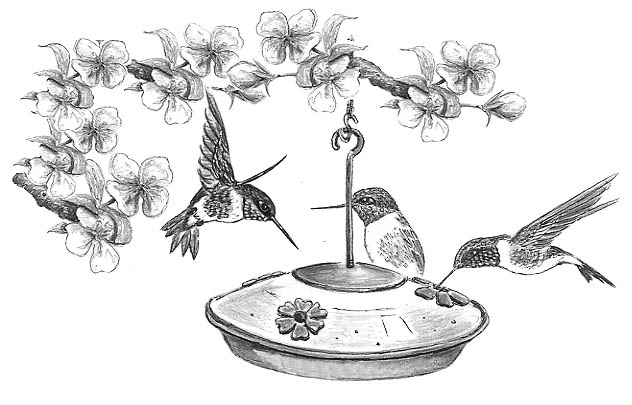
Dear Bird Folks,
I was thinking about buying my brother, who lives in Chicago, a hummingbird feeder. However, I’m not even sure if he has hummingbirds in his area. Do they get hummingbirds in the West or are they just an East Coast bird?
– Laura, Washington, D.C.
Hopefully, Laura,
Hopefully nobody from the West Coast reads this column, because if they do they might be a bit upset. I know your question was totally innocent, but asking if the West has hummingbirds is like asking if Washington, D.C. has lawyers. The West has tons of hummingbirds and they are proud of it. I guess we can’t deny the folks on the left coast a few hummingbirds. They need something to cheer ’em up. After all, on any given day those poor people have to face fires, mudslides, earthquakes and Arnold Schwarzenegger.
There are about a dozen different species of hummingbirds that are considered to be western breeders. Here in the East we have just one token species, the Ruby-throated Hummingbird. I don’t know what appeal the West Coast has for those other birds and apparently the ruby-throats don’t know either. They like the East just fine. Ruby-throats can be found breeding in any state east of the Great Plains, or east of what’s left of the Great Plains. Wanting to be sure that Chicago is indeed east of the Great Plains, I went home and checked the only U.S. map we have in our house, a laminated placemat on the kitchen table. Once confirming my hunch about Chicago’s location, I next took out my handy checklist of the birds of Cook County, Illinois. (I never go anywhere without that.) The Cook County checklist gave me the big thumbs up. Hummingbirds absolutely live and breed in and around Chicago. So the feeder for your brother is a go, Laura.
Right now you might wonder: Is it the right time of year (the middle of August) to be sending your brother a hummingbird feeder? Perhaps it would be better to wait until spring. My reply to that is: Are you kidding? I would never talk anyone out of buying a feeder. I need the business. I can’t go my entire life using a placemat for a map. But, business and placemats side, the middle of August is not a bad time to buy a hummingbird feeder. Actually, it’s one of the best times to buy one. For one thing, some of the stupid stores may put them on sale at the end of the summer. (Man, I hate those places.) More importantly, it would be hard to find a time of year when we are likely to see more hummingbirds than in August. The female hummers have just finished nesting. Most of them have had two broods, producing two chicks from each one. If I did the math right, that means there are possibly four times more hummers in the Chicago area in August than there where in June, and a whole lot more than there were in January.
Then there’s migration. Even if your brother happens to live in an area that doesn’t attract nesting hummers, it doesn’t mean migrants won’t visit his yard. Every year, from mid-July through late September, thousands of hummingbirds stream down from the north and every one of the migrants will need to stop and refuel. Hummingbirds have two food requirements, protein and nectar. They get their protein by snagging tiny insects out of mid-air. The nectar is obtained from flowers and, of course, our feeders. Many people, usually motherly types, worry that all that sugar is bad. If it’s not good for kids it must be even worse for tiny birds. Chill out, you sucrose-phobes. Sugar gives hummingbirds the quick energy bursts they need to catch the bugs. They use nectar the same way many of us use coffee. Without it not much gets done.
There is one more thing your brother needs to know about feeding hummingbirds, Laura. Whenever he decides to put his feeder out, he must clean the feeder and change the food at least twice a week. Hummingbirds have memories that would put an elephant to shame. They can remember exactly which town, which street, which yard and which tree branch had the feeder the year before. If they survive migration, they will return to look for it again. If they return and the food has spoiled, they’ll remember that too and may not come back again, ever. Next to my relatives, hummingbirds can hold grudges longer than any creatures on earth.
On a different subject:
A few weeks ago a lady named Connie wrote in from Millbrook, NY. She was worried that a female Mourning Dove that was nesting on her deck wouldn’t be able to finish incubating her eggs because the “skunk” male was never around to help her. I assured Connie that the nearly identical-looking male was taking his turn on the nest and that everything would be fine. Today I received a nice note, plus some wonderful illustrations, from Connie. She reports that both dove parents did an excellent job incubating the eggs and raising the chicks, and that the babies grew up just fine and have since flown away…just like I said they would. That’s great news, Connie. You’re a grandmother and I actually got something right. I’m thrilled for both of us.